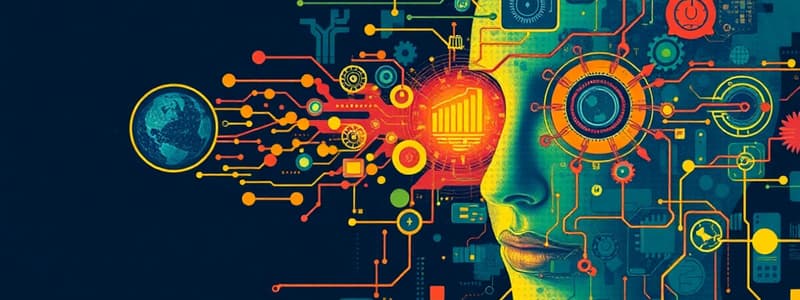Podcast
Questions and Answers
Match the types of technology with their descriptions:
Match the types of technology with their descriptions:
Preservation Technologies = Assist us in adapting to and surviving in our environments Improvement Technologies = Enhance our capabilities or help us go beyond the limits of our physical beings Destructive Technologies = Designed to achieve some aim through manipulation or control Compensatory Technologies = Created to address the unintended consequences of other technologies
Match the understandings of nature with their descriptions:
Match the understandings of nature with their descriptions:
Nature as Plastic = Viewed as an object to be shaped and controlled by humans Nature as Sacred = Reflected as divine and viewed in light of religious beliefs Nature as Teleological = Seen as moving towards a predetermined end or goal Nature as Indifferent = Concept that nature functions without regard for human concern
Match the 'scientist responsibility' with their definitions:
Match the 'scientist responsibility' with their definitions:
Total Intervention = Scientists have the right to intervene as they see fit No Intervention = Scientists have no right to intervene Limited Interventions = There are constraints on scientists' abilities to intervene Directed Interventions = Scientists should prioritize beneficial interventions for human development
Match the following definitions of technology with their descriptions:
Match the following definitions of technology with their descriptions:
Match the following dimensions of technology with their specific focus:
Match the following dimensions of technology with their specific focus:
Match the technological concepts with their implications in society:
Match the technological concepts with their implications in society:
Match the following technological terms with their essential elements:
Match the following technological terms with their essential elements:
Match the following historical technologies with their significance:
Match the following historical technologies with their significance:
Flashcards are hidden until you start studying
Study Notes
Technology and Nature
- Technology has always influenced human society, with examples ranging from fire to the wheel to modern science and the industrial revolution.
- The current technological revolution presents opportunities for intervening in life at both the micro and macro levels, including conception, birth, genetic intervention, and food production.
Characteristics of Technology
- Technology is characterized by a pragmatic spirit that prioritizes efficiency.
- The success of technology is measured by its functionality.
- Technology often prioritizes means over ends, focusing on solving problems rather than addressing why they exist.
- There is a preference for quantity over quality, leading to the use of technology even when its benefits are questionable.
- Efficiency and profit are key drivers in the development and use of technology.
- Technology is often associated with manipulation, aiming to control and rationalize life for increased productivity.
Defining Technology
- Technology can be defined by its hardware, a physical manifestation, or as a way of thinking and acting.
- "Technique" is a complex system of standardized means for achieving a predetermined result.
- Technology can be defined in five key dimensions: function, energy, fabrication, communication and control, and regulated decision-making.
Bioethics and Technology
- Technology raises ethical questions, including:
- Prioritizing quantity over quality, focusing on what is available rather than what is beneficial.
- Emphasizing means over ends, obscuring the reasons behind technological use.
- The control of information and communication systems, which can influence technological control.
Types of Technology
- Technology is categorized into five main types:
- Preservation technologies: help adapt to and survive in environments.
- Improvement technologies: enhance capabilities and overcome physical limitations.
- Implementation technologies: support the development and use of other technologies.
- Destructive technologies: manipulate, control, or obliterate through their applications.
- Compensatory technologies: address unintended consequences of other technologies.
Understanding Nature
- Our understanding of nature influences our view of technology.
- Nature as plastic: nature is viewed as an object to be shaped and controlled.
- Nature as sacred: nature is a reflection of the divine, as seen in Taoism and religious perspectives.
- Nature as teleological: nature has a predetermined end or goal, emphasizing respect for natural order.
Responsibilities of Scientists
- Scientists may approach their responsibilities using four different models:
- Total Intervention: scientists are free to intervene as they see fit.
- No Intervention: scientists have no right to intervene in natural processes.
- Limited Interventions: there are limits to scientific intervention.
- Directed Interventions: scientists prioritize interventions that foster positive human development and eliminate harmful traits.
Technology's Impact
- Technology provides comfort and convenience but also poses risks and can lead to alienation from nature.
Studying That Suits You
Use AI to generate personalized quizzes and flashcards to suit your learning preferences.




